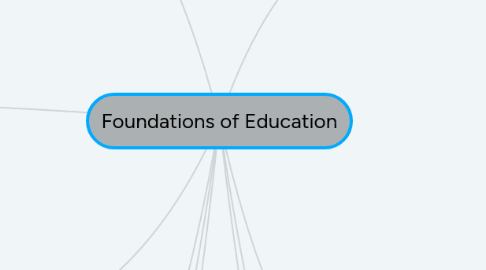
1. World View
2. Sociological Perspectives
2.1. Theoretical Prespectives
2.1.1. Functionalism
2.1.1.1. Emile Durkheim; critical importance in creating the moral unity necessary for social cohesion and harmony.
2.1.1.2. assume that consensus is the normal state in society and that conflict represents a breakdown of shared values
2.1.1.3. socialize students into appropriate values
2.1.2. Conflict theory
2.1.2.1. social order is based on the ability of dominant groups to impose their will on subordinate groups through force, cooperation, and manipulation
2.1.3. Interactionalism
2.1.3.1. the critique arises from the observation that functional and conflict theories are very abstract , and emphasize structure and process at a very general level of analysis.
2.2. 5 effects of schooling
2.2.1. Knowledge
2.2.2. Attitudes
2.2.3. Education
2.2.4. Student Peer Groups and Alienation
2.2.5. Teacher Behavior
3. Philosophy of Education
3.1. Pragmatism
3.1.1. Curriculm
3.1.2. Goal of Education
3.1.2.1. rooted in social order
3.1.3. Generic notions
3.1.3.1. Dewey's idea proposed that education start with the needs and interests of the child in the classroom, allow the child to participate in planning his or her course of study
3.1.4. Method of instruction
3.1.4.1. children learn both in individually and in groups
3.1.5. Key Reseachers
3.1.5.1. George Sanders Peirce, Williams James, John Dewey
3.1.6. Role of teacher
3.1.6.1. teacher is no longer the authoritarian figure from which all knowledge flows
4. Schools as Organization
4.1. Major Stakeholders in My District
5. Equality of Opportunity
6. Educational Reform
7. Politics of Education
7.1. Purposes of Schooling
7.1.1. Intellectual
7.1.1.1. teach basic cognitive skills such as reading, writing, and math; acquire higher-order thinking
7.1.2. Political
7.1.2.1. Inculcate allegiance to the existing political order; prepare citizens who will participate in political order; help assimilate diverse culture groups; teach children basic laws of society
7.1.3. Social
7.1.3.1. help solve problems; work together; socialize children into various roles, behaviors, and values of the society
7.1.4. Economic
7.1.4.1. prepare students for their later occupational roles and to select, train, ad allocate individuals into division of labor.
7.2. Perspective
7.2.1. Definition of educational probelms
7.2.1.1. The Conservative perspective
7.2.1.1.1. Schools have had to change to please demands of liberals and radicals
7.2.1.1.2. Encountered problems such as decline of standards, decline of cultural literacy, decline of values of civilization, and decline of authority.
7.2.2. Explanations of unequal performance
7.2.2.1. The Conservative perspective
7.2.2.1.1. Every student has the ability to succeed if they apply themselves
7.2.2.1.2. If they don't succeed, it's because they have a deficient or is a member of a group that is deficient
7.2.3. The role of the school
7.2.3.1. The liberal perspective
7.2.3.1.1. believes schools should provide necessary education for all students
7.2.3.1.2. Point of school is to socialize children into social roles
7.2.3.1.3. Teaches them respect for cultural diversity
8. History of U.S. Education
8.1. Reform Movement
8.1.1. charter schools had the most effect on education because it gave parents the right to choose what school they wanted to send their child to.
8.2. Historical Interpretation
8.2.1. The Democratic-Liberal School
8.2.1.1. believed the history of the U.S. education involves the progressive evolution of a school system committed to providing equality of opportunity for all
